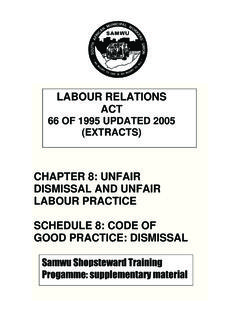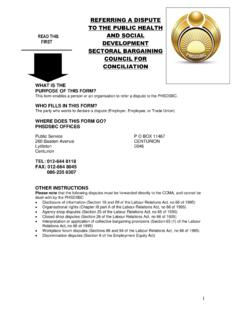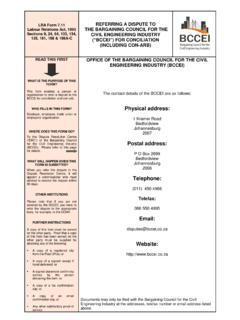Transcription of IN THE LABOUR COURT OF SOUTH AFRICA, …
1 IN THE LABOUR COURT OF SOUTH africa , johannesburg Not Reportable Case no: JR509/2014 In the matter between: SPECIAL INVESTIGATING UNIT Applicant and COMMISSION FOR CONCILIATION, MEDIATION AND ARBITRATION First Respondent COMMISSIONER MABEL SIKITI Second Respondent NEHAWU obo HERBERT LUBITA Third Respondent Heard: 19 April 2017 Delivered: 21 April 2017 JUDGMENT TLHOTLHALEMAJE J 2 Introduction [1] This is an application to review and set aside the arbitration award issued by the second respondent (Commissioner) dated 29 January 2012. The crisp issue before the Commissioner was whether the failure to institute disciplinary proceedings following upon a complaint and investigations against an employee constituted an unfair LABOUR practice within the meaning of section 186(2) of the LABOUR Relations The Commissioner not only found that such a failure constituted an unfair LABOUR practice, but she also awarded the third respondent, Herbert Lubita (Lubita), six months compensation.
2 Background [2] The background facts to this matter are fairly common cause. Lubita was employed by the applicant as a Project Manager since June 2006. On 12 June 2013, Andries Le Roux (Le Roux), the applicant s Investigating Officer of the Internal Integrity Unit lodged a complaint with the applicant relating to the authenticity of Lubita s educational qualifications that he had obtained in Uganda. Le Roux s functions included conducting screenings and due diligence investigations on all prospective members of the applicant as well as screening on all members currently in the employ of the applicant. [3] Lubita was due for screening in 2013 and Le Roux had formed an opinion that Lubita may have been guilty of making fraudulent and false statements. Le Roux concluded further that Lubita may have a case to answer to, and a notice was sent to him on 5 June 2013, advising him of the complaint. He was afforded an opportunity to respond to the complaint.
3 [4] It was common cause that Lubita obtained the necessary information from Uganda to verify his qualifications, and had submitted his response on 28 June 2013. It was further common cause that a similar screening process had been embarked upon in July 2007 subsequent to Lubita s appointment. 1 66 of 1995, as amended. (LRA) 3 Nothing further took place after Lubita had submitted his response in June 2013. [5] Aggrieved by the applicant s failure to take any further action on the matter, Lubita then approached the CCMA with an alleged unfair LABOUR practice dispute. The essence of his dispute was that the applicant had committed an unfair LABOUR practice in that it made allegations against him and yet failed to charge or take any disciplinary action against him within 90 days in accordance with the applicant s own Disciplinary Code and Procedure.
4 He contended that the conduct of the applicant constituted disciplinary action short of a dismissal. In regards to relief, he sought that the allegations against him be withdrawn, and that he be paid compensation. The arbitration proceedings and the award [6] At the arbitration proceedings, only Lubita led evidence in his case. Not much turned on the oral evidence led by Lubita as most of the issues were common cause. The applicant s case however was that the CCMA lacked jurisdiction to determine the dispute as Lubita had neither been suspended nor disciplined. [7] The Commissioner s reasoning in regards to the question of jurisdiction was that upon a reading of section 186(2)(b) of the LRA, disciplinary action in a form of a complaint had occurred . The applicant, according to the Commissioner, had failed to comply with its own disciplinary code and procedure and therefore its actions were tantamount to an unfair LABOUR practice by an employer on an employee.
5 [8] The Commissioner further found that the conduct of the applicant in subjecting Lubita to further screening when the same process was completed in 2007 was mala fide or not justified. In regards to the remedy, the Commissioner having made reference to section 193(3) (Sic) and 194(4) of the LRA concluded that six months compensation was justifiable having taken into account Lubita s age, the nature of his job, and the complaints laid against him, which had a bearing on his integrity and future endeavours . 4 Evaluation [9] The test that this COURT applies in determining whether the arbitrator s decision is reviewable is that as laid down Sidumo and Another v Rustenburg Platinum Mines Ltd and The question to be posed and answered is: whether the conclusion reached by the arbitrator was so unreasonable that no other arbitrator could have come to the same conclusion. The arbitrator s decision must therefore fall within a range of decisions that a reasonable decision maker could make.
6 [10] This matter is one where it can without any doubt, be concluded that the Commissioner went on a frolic of her own, misapplied and misinterpreted the law, exceeded her powers and essentially felt sorry for the employee. To cap it, the Commissioner went a step further by granting Lubita what Counsel for the applicant correctly referred to sympathy compensation . The award cannot by any account pass the standard of a reasonable decision maker test. My conclusions in this regard are based on the following. [11] An unfair LABOUR practice in section 186(2) of the LRA is defined as: Unfair LABOUR practice means an unfair act or omission that arises between an employer and an employee involving (a) unfair conduct by the employer relating to the promotion, demotion, probation (excluding disputes about dismissals for a reason relating to probation) or training of an employee or relating to the provision of benefits to an employee; (b) the unfair suspension of an employee or any other unfair disciplinary action short of dismissal in respect of an employee; (c) a failure or refusal by an employer to reinstate or re-employ a former employee in terms of any agreement; and (d) an occupational detriment, other than dismissal, in contravention of the Protected Disclosures Act, 2000 (Act No.)
7 26 of 2000), on account 2 [2007] 12 BLLR 1097 (CC); 2008 (2) SA 24 (CC); (2007) 28 ILJ 2405 (CC). 5 of the employee having made a protected disclosure defined in that Act. (Emphasis added.) [12] In this case, it was common cause that all that the applicant, through Le Roux, did was to lodge a complaint about the authenticity of Lubita s qualifications. As an employee within a state organ, Lubita was not immune from scrutiny to determine whether he was a fit and proper person to occupy his post, and the applicant was therefore entitled to invoke its screening processes against him. [13] Flowing from the complaint lodged by Le Roux, Lubita was afforded an opportunity to respond which he duly did, and no further steps were taken by the applicant. It is apparent from these chain of events that to the extent that the provisions of section 186(2)(b) of the LRA are relied upon, there is no basis upon which it can be concluded that there was an unfair suspension or any other unfair disciplinary action short of dismissal in respect of Lubita.
8 [14] John Grogan3 in analysing the provisions of section 186(2)(b) stated that: To fall within the terms of section 186 (2) (b), disciplinary action against an employee short of a dismissal must be disciplinary both in nature and in intent. Action is disciplinary if it is aimed at correcting errant behaviour for which the employee is responsible. So, for example, a counselling session or a warning for incapacity does not fall within the scope of the definition. The definition is also concerned with disciplinary action. The decision to hold a disciplinary enquiry does not fall within the definition of an unfair LABOUR practice- the action must have been instituted before an employee can refer a dispute relating to disciplinary action short of dismissal. The word action also suggests that employees may not refer a dispute over the content of an employer s disciplinary policy. A dispute may be entertained only if the employer actually takes action.
9 Only the LABOUR COURT or, perhaps, the High COURT , has the power to interdict a disciplinary hearing. 3 Grogan Employment Rights 1st ed (Juta & Co, Cape Town 2013) at 135-6. 6 [15] In this case therefore, the mere fact that an employee is aggrieved by the lodging of a complaint or the institution of some form of investigation against him or her cannot by any stretch of imagination be construed as disciplinary action, let alone one that is short of being a dismissal. An investigation or a complaint against an employee cannot be equated with disciplinary action. To hold otherwise would lead to absurdity and untenable consequences in that employers would ordinarily be reluctant to investigate any allegations of misconduct against employees, and employees in turn would be reluctant to lodge complaints against each other or their managers. The interpretation or application of section 186(2)(b) of the LRA cannot be stretched that far, and the Commissioner clearly misinterpreted those provisions.
10 [16] To the extent that there was no disciplinary action, let alone any action short of a dismissal, the Commissioner equally had no jurisdiction over the matter as there was no dispute between the parties. Lubita may have been aggrieved by the complaint and investigation against him, and understandably so since he had not heard anything about the status of those investigations. However, various options were available to him, including lodging a grievance against the complainant, or approached this COURT for relief. He could however not have approached the CCMA as he had neither been suspended nor disciplined, and the CCMA clearly lacked jurisdiction in circumstances where there was no live dispute between the parties. [17] More worrisome with the award however is that the Commissioner, in circumstances where she had no jurisdiction to determine the matter as there was no dispute before her, had inexplicably found cause to order compensation equivalent to six months salary.















